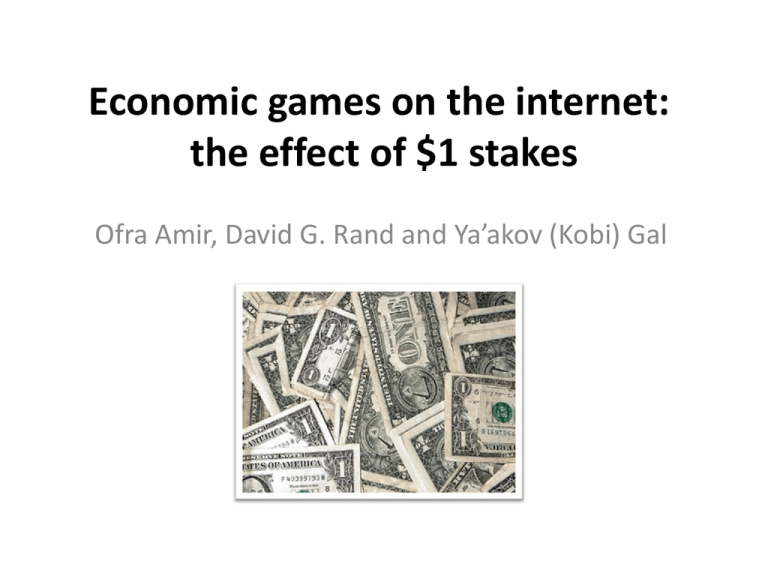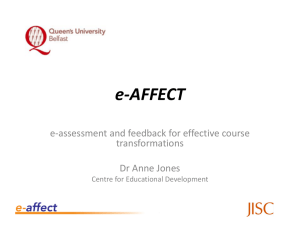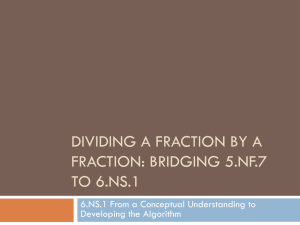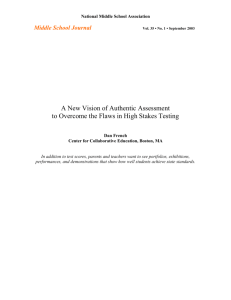presentation
advertisement

Economic games on the internet: the effect of $1 stakes Ofra Amir, David G. Rand and Ya’akov (Kobi) Gal Background – Amazon Mechanical Turk 2 Background – Amazon Mechanical Turk 3 Motivation – experiments with online markets • Fast, cheap, low effort • Incentive compatible • Cross-cultural 4 But aren’t the stakes too low? • Payments on MTurk are usually low • Previous studies found quantitative agreement between low-stakes games on Mturk and highstakes games in the lab [Suri & Watts 2011; Horton Rand Zeckhauser 2011] • Contributions of the current study: – Testing, within one consistent experimental platform, whether having $1 stakes matters on Mturk – Comparing the effect of stakes on MTurk to the effect of stakes in physical labs 5 Experimental Design • Four canonical economic games – – – – – dictator game public goods game ultimatum game trust game • Two payoff conditions: – stakes condition – no-stakes condition • 1129 subjects, each assigned randomly to one of the four games and one of the two conditions. 6 Related work – the effect of stakes • Dictator Game (Forsythe, 1991; Carpenter et al., 2005) – Significant difference in decisions between stakes and no stakes • Public goods game (Kocher, 2008) – No significant difference in contributions when raising stakes • Ultimatum Game (Forsythe, 1991; Carpenter et al., 2005; Hoffman et al. 1996) – No significant difference in offers between stakes and no stakes – Player 2 rejection rate – No difference \ decreases when raising stakes • Trust Game (Johansson-Stenman et al., 2005; Sutter & Kocher, 2007) – No effect in behavior \ Decrease in fraction sent when raising stakes 7 – No change in fraction returned by the trustee Results - Dictator game Player 1 transfer • Mean transfers of player 1 (stakes condition transferred 10 units less on average) Stakes 8 No Stakes Dictator game • Distribution of transfers (sig. difference, p-value=0.022) Stakes No Stakes 9 Public goods game Contribution • Mean contribution to the public goods, possible contribution between 0-40 Stakes 10 No Stakes Public goods game • Distribution of contributions (no sig. difference, p-value=0.656) Stakes No Stakes 11 Ultimatum game – player 1 Offer • Mean player 1 offers 12 Stakes No Stakes Ultimatum game – player 1 • Distribution of player 1 offers (no sig. difference, p-value=0.1659) Stakes No Stakes 13 Ultimatum game – player 2 Minimum Accepted Offer • Minimum accepted offer (p-value= 0.1941) Stakes 14 No Stakes Ultimatum game – player 2 Rejection probability • Probability to reject by player 1 offer 15 Fraction offered Trust game – player 1 Transfer • Means of player 1 transfers, possible values between 0-40 Stakes 16 No Stakes Trust game – player 1 • Distribution of player 1 transfers (no sig. difference, p-value=0.3863) 17 Trust game – player 2 Fraction returned • Fraction returned by player 2 18 Fraction transferred by player 1 Comparison with labs results • Dictator game: Real money: mean = 0.332 Hypothetical: mean = 0.44 616 studies from Engel 2010 19 Comparison with labs results • Trust game – player 1: Real money: mean = 0.58 Hypothetical: mean = 0.551 20 Fraction sent by P1 143 studies from Johnson & Mislin 2010 Comparison with labs results • Trust game – player 2: Real money: mean = 0.47 Hypothetical: mean = 0.45 21 Fraction returned by P2 143 studies from Johnson & Mislin 2010 Summary • Significant decrease in transfers in Dictator Game when using $1 stakes compared to no stakes • No effect of stakes in public goods, ultimatum game and trust game • Consistent with previous lab studies that used higher stakes • Supports findings from replication studies which validated results of experiments run on MTurk 22 Questions? 23











